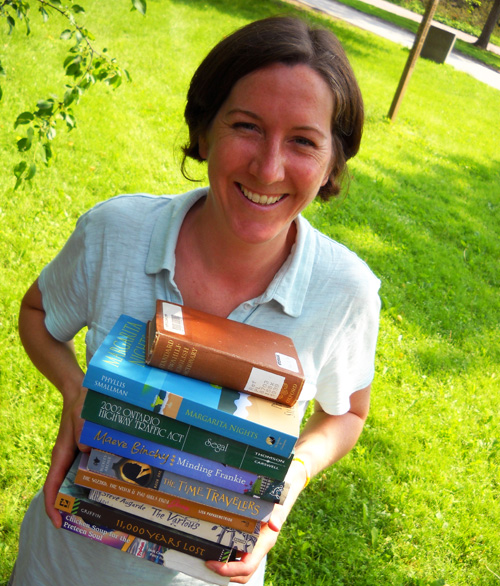
She’s already packed her limit of three suitcases’ worth of kids’ books. But there’s one book Natalie Carter plans to carry in her hand luggage to peruse during this month’s flight to Africa: a Swahili-English dictionary. A master’s student in population medicine, she figures the volume will be useful for her planned six-week stay in a remote village in eastern Kenya.
During her second trip to the East African country in as many years, she will divide her time between research and development work.
Carter began graduate studies last fall with Prof. Cate Dewey, chair of Population Medicine. Working with smallholder farmers in Kenya, they are formulating pig rations using locally grown foodstuffs. Many farmers raising up to three pigs on less than two hectares of land need help finding cheap, nutritious feed for their livestock.
That work will see Carter visiting farmers – along with an interpreter – to discuss their lives and livelihoods. She’ll be based in a village called Kikule. That’s the hometown of her Kenyan collaborator, Florence Mutua, who completed a PhD in Population Medicine last year and now teaches at the University of Nairobi. Together, they will also work with women’s groups to help develop small businesses.
Carter plans to stay with Mutua’s family during the trip, from mid-June to mid-July.
And the books? Carter has collected them to help stock a library she’ll help to build in the village. That’s a needed resource, she says, for area children who otherwise struggle to prepare for high school or university.
A local group will build the library using available materials – brick walls, a thatched roof, solar-powered lights. Besides taking books, Carter will tote along construction skills she’s picked up from projects at her family’s Ottawa Valley cabin.
Carter first visited Kenya last year with Dewey, students in the Ontario Veterinary College Global Vets program and members of Veterinarians Without Borders. They travelled to the Busia district near the Ugandan border, where Dewey has led humanitarian projects through her own charity, called Children of Bukati.
“I never expected such a warm welcome from the people. It’s a beautiful place,” says Carter. Recalling their visits to discuss farmers’ concerns, she says, “These people literally have nothing, but they want to offer tea or sweet potatoes.”
She says she was inspired by learning about Dewey’s work abroad. “It totally spoke to me. I wanted to make a difference.” Discussions last year led first to Carter’s initial visit to Kenya and then to her grad degree.
She’s pursuing her studies part-time. By day, she’s the OMAFRA-U of G research programs assistant for the Office of Research.
Earlier, Carter had worked at U of G research stations and at the Canadian Food Inspection Agency in Ottawa. She earned a diploma in agriculture at U of G’s Kemptville Campus in 1998.
“I’m passionate about this kind of work, using my knowledge of agriculture to teach other people and enable them to improve their livelihood.”
Those traits are what caught Dewey’s eye. “These are ideal for an M.Sc. student whose project will directly help smallholder farms where raising a pig means families can eat, receive medical help or go to school,” says the professor.
Besides doing hands-on research on last year’s trip, Dewey says Carter “rolled up her sleeves and developed blisters while hoeing the soil and planting vegetable gardens at the Bukati primary school to provide lunch for AIDS orphans.”